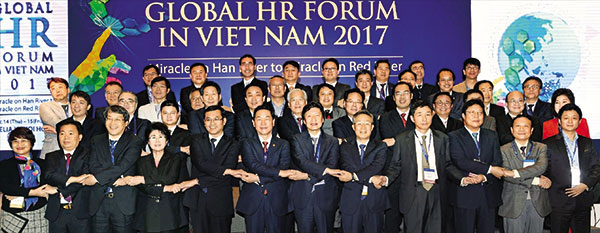HR lessons of ‘Miracle on Han River’
 |
| South Korea rode increasing HR quality to economic emergence |
At last week’s South Korea-initiated Global HR Forum 2017, held in Vietnam for the first time, more than 300 Vietnamese and South Korean government officials, business leaders, startup entrepreneurs, and university representatives talked human resources (HR) exchanges and training co-operation between Vietnam and South Korea in the age of Industry 4.0.
During the two-day event, titled “Miracle on the Han River to Miracle on the Red River,” experience and lessons about the so-called ‘Miracle on the Han River’ – which helped develop South Korea from a poor nation in the late 1950s into a leading Asian economy from the 1990s – were also shared.
As part of the forum, Vietnam and South Korea shared visions in co-operatively cultivating talents to serve the requirements of the Industry 4.0 era.
At the event, Vietnamese Minister of Education and Training Phung Xuan Nha said that HR plays a key role in a country’s socio-economic development. In the Industry 4.0 era, Vietnam is facing new challenges in its HR development.
“Vietnam is hoping to gain from the experiences of developed countries, including South Korea, to improve our HR quality,” Nha said. “HR development is considered a breakthrough measure to leverage economic development and growth quality.”
Korean Minister of Education, Kim Sang-kon, hoped that the forum would provide an opportunity for the two countries to discover measures to make education and training co-operation more practical, while strengthening ties in economy, culture, and society.
During last week’s Global HR Forum in Vietnam 2017, the nations jointly debuted a new educational platform, which enabled in-depth discussion of policy development in cultivating HR and exchanges.
According to Dr. Yoon Dae-Hee, former Minister of Policy Co-ordination of South Korea, Vietnam is facing challenges related to rising labour costs and an ageing population, as well as an insufficiently-skilled workforce. Workforce quality is becoming more important, and higher education is needed for the transition to a high-end economy.
“Policy suggestions for the economic development of Vietnam are to increase overall labour productivity by matching skills and labour market needs, raising higher education completion rates, and introducing creativity-centred education programmes,” he said.
For the ‘Miracle on the Han River’, South Korea gained ground thanks to various strategies that the country implemented in HR development. During this time, GDP per capita rose from $67 in 1953 to $20,795 in 2006, while export value ascended from $120 million in 1964 to $495.4 billion in 2016.
According to experts, to realise ‘The Miracle on the Red River’, training and improving the quality of HR must come with breakthrough changes and accelerated speed, with universities playing an important role.
The event’s presenters spoke on the impressive effects of a quality workforce – taking the stage were luminaries such as Nguyen Xuan Cuong, vice chairman of the Vietnam Digital Communications Association, Trinh Minh Giang, chairman of Venture Management Consulting Group, and Nguyen Thanh Nam, vice chairman of FPT University.
Jointly organised by Vietnam’s Ministry of Education and Training (MoET), the Ministry of Education of South Korea, and the Korea Economic Daily, the event marked the 25th anniversary of formal diplomatic relations between the two countries.
After establishing diplomatic ties in 1992, the connection between Vietnam and South Korea has strongly deepened, with a number of agreements signed since 2007, including several in education and training.
In the latest agreement signed between MoET and the Ministry of Education of South Korea in March 2017, Vietnam sent 26 teachers to South Korea from April to June, and South Korea sent 34 teachers to Vietnam from September to December.
By the end of February 2016, Vietnam had 8,293 students enrolled in schools in South Korea, making up 7.8 per cent of the country’s 96,357 overseas students, just behind China.
In addition, South Korea is now Vietnam’s biggest foreign investor, with $57.5 billion worth of registered capital as of November 2017.
What the stars mean:
★ Poor ★ ★ Promising ★★★ Good ★★★★ Very good ★★★★★ Exceptional
Latest News
More News
- State corporations poised to drive 2026 growth (February 03, 2026 | 13:58)
- Why high-tech talent will define Vietnam’s growth (February 02, 2026 | 10:47)
- FMCG resilience amid varying storms (February 02, 2026 | 10:00)
- Customs reforms strengthen business confidence, support trade growth (February 01, 2026 | 08:20)
- Vietnam and US to launch sixth trade negotiation round (January 30, 2026 | 15:19)
- Digital publishing emerges as key growth driver in Vietnam (January 30, 2026 | 10:59)
- EVN signs key contract for Tri An hydropower expansion (January 30, 2026 | 10:57)
- Vietnam to lead trade growth in ASEAN (January 29, 2026 | 15:08)
- Carlsberg Vietnam delivers Lunar New Year support in central region (January 28, 2026 | 17:19)
- TikTok penalised $35,000 in Vietnam for consumer protection violations (January 28, 2026 | 17:15)
















 Mobile Version
Mobile Version